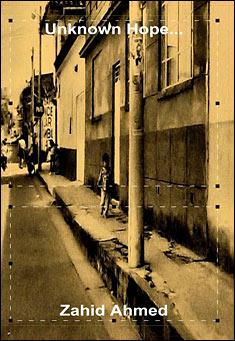A novella by Indian writer, Zahid Ahmed, set in India against the backdrop of World War 1. Unknown Hope focuses on the other side of life of a kid whose world changes drastically. Ironically not by devastation or mass killing.
Guddu, a callow young boy, is unaware of his parents wherabouts. When the war begins his jaunting off around the railway station ceased. And the station is captured and used only by military men. One day he is carried away by an unfamiliar coal train, quite near to the battlefield. There, he hopes to find his father. Meanwhile, he is morally abducted by a female medical officer. And a story of benign infatuation takes place between two of them.
Excerpt:
Late monsoon days had not made the most convenient way for extremely cold winters yet. The morning was very much dewy initially. As the spell proceeded, it turned out quiet morning like other undisturbed days. And the illusive fog had almost been diminished by this time. The position of the sun was at early stage, later it would become variable and unreliable. The sheesham trees on both the sides of the long stretched narrow road had silent boughs and sleepy canopies. The boles looked shrivelled into ineffectual sun rays. The far off mountains as always looked hazy and white, and often glistened when the sun shuffled over the sheets of swarming grey and heavy clouds. The rays, bunch of golden beams, whenever poured down like sudden waterfalls, patches of brightness and vividness had caused immense joy on the earth.
He was out for a while. Had a hope, and longing to see how life runs in sheesham trees when they got actuated by tender zephyr. It had murmured a new day’s enigma into him. The morning soft breeze was extremely slow in pace, crossing him like cavalier ripples. Being in ignorance but brazen too, lustily. Deliberately. He returned inside.
“This ceramic mug is given by your father.”
“They call it Chini-mugga because it comes from Cheen.”
“When will father come to meet us.” he asked, and at this Nana sensed embarrassingly that this little boy might get nostalgic or at least ruin his morning mood and might delay him reaching the factory.
“They both would come soon.”
“When, next week or month?” he asked quite innocently. And expected an immediate reply.
“May be at this Eid; as they promised last time.”
He kept his emptying ceramic mug with a thud. So big that it was tough to hold comfortably. He squatted down comfortably, in semi-meditative posture. It reduced the distance between Chini-mugga and his jaw. Hands coordination had bettered. Nani poured two small cups into his Chini-mugga. The black simmering tea brimmed up till the roundness. It was sheer hot; the steam was rising up in rapid gusts of vapours. His eyes broadened, he thrust his face over it, twisted his face like a mouse and felt the hot pleasing steam, rising up through his jaw and face. Nani was seated opposite him, she was sitting quietly. He was certain he had to devour the entire tea with ghee smeared rotis. Nana rolled up another roti and dipped soundlessly, and stirred into his indigenous mugga, and ate in haste morsels. He finished. Stood up and went outside. It wasn't raining then. He sat on the charpoy, which was laid in the courtyard beneath the sheesham tree. He began smoking beedi like a veteran smoker in a vacant disposition.
Nani and he were seated inside the thatch roofed hut. Nani could not get up until he finished tea. Her deep gaze fixed on him and he was untidily sipping and devouring. Stained his magenta kurta, drops from mouth trickled down on his legs around the locked ankles.
“Guddu, would you like to eat more rotis? If so, let me know I will prepare some more tea.”





